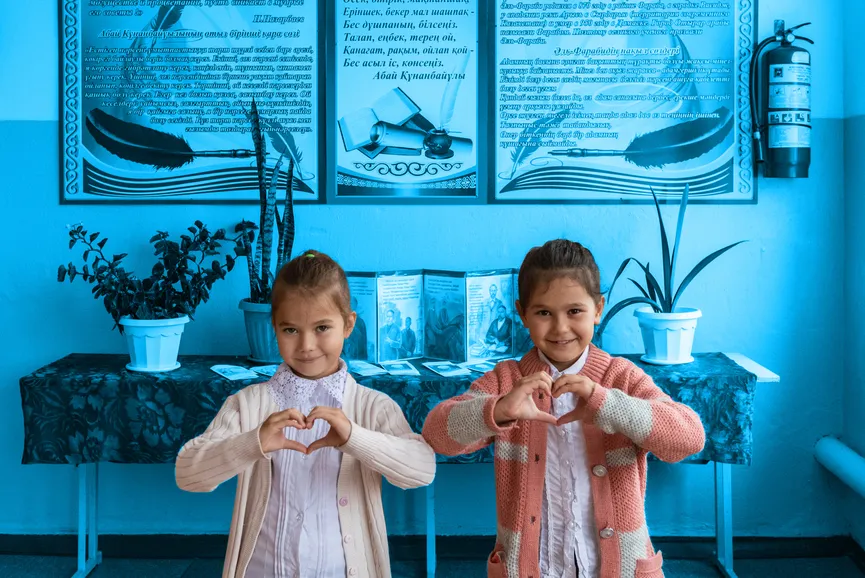Thirty years ago, on February 16, 1994, Kazakhstan signed the Convention on the Rights of the Child (CRC), the only international document that comprehensively defined the rights of children, UNICEF reports.
To date, the CRC is the most widely accepted declaratory document in history, playing a key role in transforming the lives of children around the world. The core principles of the Convention include the equal rights of all children to life, development, protection, and freedom from discrimination.
By Resolution of the Supreme Council, Kazakhstan officially ratified the CRC on June 8, 1994, after signing the same in February of that year. Thus, Kazakhstan voluntarily assumed the global obligation to ensure equal rights for every child. The Convention has become both a tool for building a child-friendly society in Kazakhstan and the foundation for cooperation between the United Nations Children's Fund (UNICEF) and Kazakhstan.
What has changed?
Over the past three decades, Kazakhstan reduced its under-five mortality rate fivefold and its neonatal mortality rate nearly fourfold.
In 2016, a presidential decree established the Institution of the Ombudsman for Children's Rights, and in 2022, the Government appointed Ombudsmen for Children's Rights in each region of Kazakhstan. This structure provides children and their caregivers with the opportunity to seek help for suspected violations of the rights and interests of children.
In 2023, Kazakhstan adopted its Social Code, which extends social childcare benefits for children until they reach 18 months. This year, the Government also launched the ‘National Fund for Children’, which distributes 50% of its investment income among all children under the age of 18. Upon reaching 18, beneficiaries can use the funds for education or housing.
Last year, Kazakhstan ratified the latest, third optional protocol of the CRC, establishing a mechanism for considering individual complaints from children or their caregivers for alleged CRC violations. This confirms the nation’s commitment to ensuring children’s rights and expanding mechanisms for their legal protection.
"Children are the main beneficiaries"
Kazakhstan’s Chairman of the Committee for the Protection of Children's Rights, Nasymzhan Ospanova embarked on the country’s achievements.
“Today, the Committee is registered with the Depository of the Kingdom of the Netherlands as an authorized body responsible for implementing multiple international conventions protecting children's rights and for submitting a periodic report on the situation of children in Kazakhstan to the United Nations Committee on the Rights of the Child. Reports provided by Kazakhstan demonstrated that the policies and practices of our country comply with the Convention. These reports subsequently served as the basis for assessing the progress made so far.
It is important to note that in almost all national strategic documents, children are the main beneficiaries. Many countries around the world assess the well-being of children and develop tailored approaches. Kazakhstan is no exception.
On behalf of the Head of State, the Government introduced the Child Well-Being Index, a national monitoring tool enabling users to select and compare national child well-being indicators by region with international ones.”
What is yet to change?
Acting Representative of UNICEF in Kazakhstan, Laetitia Bazzi-Veil, noted the following:
“Looking back, it is evident that for over 30 years Kazakhstan has made significant progress in protecting children's rights. In 1992, Kazakhstan became the first country in Central Asia to which UNICEF sent a multidisciplinary assessment team. In the same year, UNICEF assisted with providing necessary medicines and vaccines for children. In the three decades since, UNICEF has been working in Kazakhstan to protect and promote the well-being of every child and provide necessary assistance to the Government and civil society.”
Bazzi-Veil outlines new priorities and goals for Kazakhstan to achieve in the future. These priority issues include developing and implementing a unified national strategy for the protection of children’s rights – which would serve to unite partners and establish uniform goals to implement the child-rights agenda – as well as a comprehensive monitoring system for children’s rights. Achieving these priority goals will help accelerate progress in protecting children's rights in clear alignment with the Sustainable Development Goals (SDGs).
